India strike: Voices from the streets
- Published
Opposition parties and trade unions in India have held a day-long strike over plans to open up the country's retail sector to global supermarket chains and other reforms. BBC correspondents in Delhi, Hyderabad, Calcutta and Srinagar spoke to people on the streets to gauge their reaction.
RK GOYAL, DIAMOND JEWELLERY TRADER, DELHI
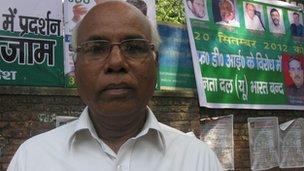
Fifty million traders are staring into a financial abyss if the government implements its decision to open up the retail sector to global supermarkets. Besides, there are millions of others in the country who are employed by small traders like us and this larger population is dependent on us, so the government will have to listen to us, otherwise they will fall.
But we have faith in the government, we have chosen this government and I think they will decide in our favour and roll back the decision.
YASIR ARFAT, TELECOMS MANAGER, SRINAGAR
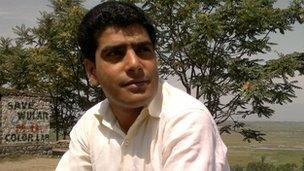
Foreign Direct Investment (FDI) in any sector actually speeds up growth. We live in the 21st Century, so we cannot think like we are in the Soviet era.
The global economy is changing, people are changing. India is a country of vast economic opportunities, and an old-fashioned bureaucratic structure cannot exploit those opportunities to the hilt.
While we need to ensure that the new policy safeguards the interests of the common masses and farmers, I think it is a right decision to adapt to a futuristic economic vision.
MANJEET RAI, COAL TRADER, DELHI
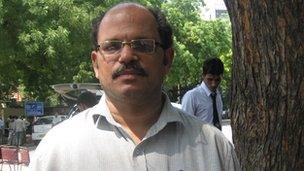
If the government is going to decide its national policy on the basis of critical reports in the international media, then that is an extremely sorry situation. [Prime Minister] Manmohan Singh should stop worrying about what's being said outside the country and pay more attention to the voices coming from inside.
It is clear that this government has not kept the interests of people in its mind while taking decisions. It is [US President] Barack Obama and other Western countries who are calling the shots and deciding what should be the economic policy of India.
SAMIR PRAMANIK, PRIVATE FIRM EMPLOYEE, CALCUTTA

I support the issues behind the strike. The way [PM] Manmohan Singh's government has failed to contain the price rise, we the common people are really struggling.
The government recently announced a cap on the number of subsidised cooking gas cylinders which each family can get in a year. Every family needs eight to 10 gas cylinders every year, so I think the government needs to increase the cap from the current six cylinders.
I fully support Mamata Banerjee's opposition to these policies and her decision to quit the government.
I think opening the retail sector will benefit us, the consumers, because we will be able to get our daily stuff at a cheaper price. But I'm not sure whether the farmers will benefit from the policy.
AMJADULLAH KHAN, SMALL BUSINESSMAN, HYDERABAD
The strike is causing a lot of difficulties for a small businessman like me. I wanted to buy some supplies today [Thursday] but all the major shops are closed.
Shops were closed yesterday on account of a festival and today it is the strike. It is adding to our misery. It is already tough times for us, economically.
No problem is going to be solved by strikes. What have they achieved by calling earlier strikes? The government will do what it wants to do. If these [opposition] parties were in power, they would also increase the prices. It is all cheating.
GHANSHYAM DAS, PRIVATE FIRM WORKER, DELHI
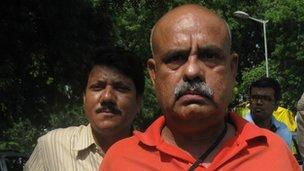
The Indian public is being held ransom to the differences between Mamata Banerjee and Sonia Gandhi.
I want to request Mamata Banerjee to take back her decision to withdraw support from the government.
I think the decision to open the retail sector to global supermarket chains was not taken on the basis of any public interest. I think it was driven by politics and personalities - it's become Mamata Banerjee versus Sonia Gandhi.
We are a poor country and we cannot afford to have mid-term elections. We need the government to take sound economic decisions.
RAHEEL KHURSHEED, SOCIAL ACTIVIST, SRINAGAR

Even as we wait for this decision to open up the retail sector to global supermarkets to take practical shape beyond the policy stage, a good yardstick for judging the impact of this decision will be as to what it will do for the consumers and the farmers.
As long as the decision leads to better prices and more choices for the consumer, better prices for the farmers and an upgraded, competitive supply chain, the decision makes sense.
KIRAN KUMAR, IT PROFESSIONAL, HYDERABAD
The strike has not made any difference. We are working as usual as our company has its own transport system.
Normally such strikes don't affect our work. Nobody comes here to create any disturbances.
As for opening up the retail sector is concerned, I think it is very good step. It will be good for the economy and consumers. I don't think any harm will come to anybody because of foreign companies entering the retail sector. I hope that services will improve and standard of goods will improve.
Similar apprehensions were expressed when computers came, foreign IT companies came and foreign banks came. See what happened? Each of these sectors benefited.
GANESH HELA, OFFICE WORKER, CALCUTTA
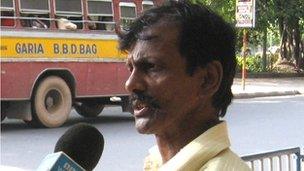
No-one can oppose this strike, or rather the issue of the strike.
And because people are so agitated, the strike is a complete one - you can see it for yourself.
The government is unable to ease our problems. The price of everything is going up... from rice to vegetables to cooking gas to diesel.
And once foreigners come into the retail market, if we can get things at a cheaper rate, it's fine, it'll be a relief for us. But I don't think that will happen - only wealthy people and the politicians will benefit - not us.
Input from Divya Arya in Delhi, Amitabha Bhattasali in Calcutta, Omer Farooq in Hyderabad and Riyaz Masroor in Srinagar
- Published20 September 2012